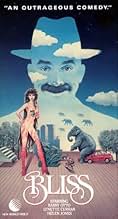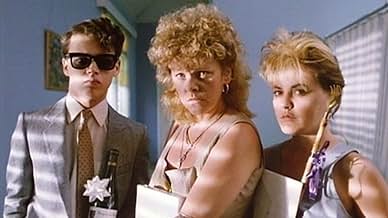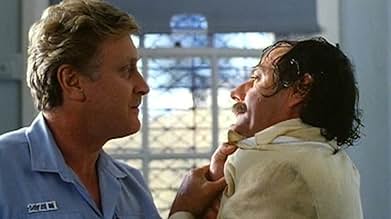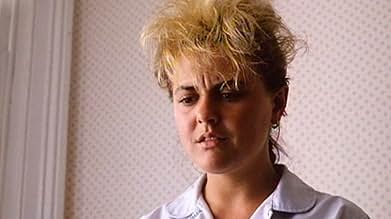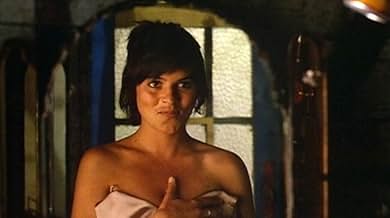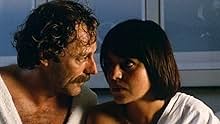Aggiungi una trama nella tua linguaAfter a near-death experience, a man wonders if he actually did die and is now in Hell.After a near-death experience, a man wonders if he actually did die and is now in Hell.After a near-death experience, a man wonders if he actually did die and is now in Hell.
- Premi
- 4 vittorie e 11 candidature totali
- Harry's Mother
- (as Sara De Teliga)
- Harry's Daughter
- (as Saski Post)
- Dwarf
- (as Marco Colombani)
Recensioni in evidenza
Harry Joy, an advertising executive, has a near-fatal heart attack - but when he recovers he is convinced he is in hell. And why not? His bitchy wife is having a torrid affair right under his nose, his son is trading drugs for sex with his own sister, and his ad agency represents the most destructive and polluting companies in town. Harry's life spirals out of control until he breaks away from his awful family and finds redemption in his love for the beautiful Honey Barbara.
Filled with extraordinary images, the film captures the surreal mood, the sense of hidden menace and the outrageous black humour of Carey's book, and brings the characters vividly to life.
Barry Otto, one of Australia's greatest actors, is perfect as Harry and he is brilliantly supported by an outstanding cast, including Lynette Curran as his horrible wife, Miles Buchanan as his evil and depraved son, Gia Carides as the daughter, and especially Helen Jones as his hippy 'innamorata', Honey Barbara.
If you can find it, the longer "director's cut" version is a must-see, for the amazing police-station scene - inexplicably removed from the initial release version - where Harry, under arrest after a series of bizarre and hilarious incidents, transfixes the cops with one of his famous stories. Barry Otto delivers an electrifying monologue, in one long, unedited scene, with the camera gradually pulling closer and closer to an extreme closeup of his face.
"Bliss" is director Ray Lawrence's only feature film to date - but one perfect film is better than ten duds!
If you like your movies a bit different this is really different and well worth a try if your adventurous.
Other movies I like include Babel Das Boot, Dr Strangelove, V, American Beauty, Being John Malkovich, Bad Santa.
Barry Otto plays a man with a lot of personal conflict, and a strange sort of charisma. He's a storyteller above all, and that's what "Bliss" is also most interested in. Creating real people first, then putting them into the plot. Everyone is developed as much as they need to be, fleshed out to surprising degrees. Barry Otto is very good as the storyteller, but the really surprising bit is the performance of Helen Jones.
There's certainly flaws to the film as a whole. It goes too far down certain trails, gives too much importance to some events that don't necessarily lead forward. But the best parts are amongst the best bits of any film of this style, so the missteps can be forgiven. If you like slightly messy, mostly brilliant, mostly forgotten films, "Bliss" is perfect for you.
Almost twenty years on, the 'groundbreaking' aspects of Bliss seem tame and quaint, rather like the first episodes of 'Last of the Australians' in which Alwyn Kurts uttered the word 'bastard' on prime time sitcom television. So too, the attention seeking camera-work and 'innovative' narrative treatment strike this viewer as lethargic and unremarkable. The film has been described as 'lauded' but it is worthy of note that at the time it was a box-office disaster, and the industry in general deigned to provide Ray Lawrence with sufficient funds to make another feature until sixteen years later. I know (indeed expect) that many film fans will violently disagree with me, but I welcome (civilised) dissent. Bliss has failed to enhance its reputation with the passing years, but then again I am still of the opinion that Jackson Pollock's paintings are rubbish, and expect to find myself bailed up by the 'cognoscenti' on the cocktail party circuit..
The protagonist, Harry Joy, teller of tales (especially to policemen), can sell almost any campaign to his morally challenged clients. He drives a Jaguar and lives in a splendid large house in the leafiest part of Sydney's North Shore. Unfortunately Harry is felled by a heart attack after a long (family) lunch and wakes up in what appears to be Hell, which strangely enough seems to be just like his life on earth. He finds his wife shamelessly carrying on with a particularly vulgar American colleague, his nerdy Young Liberal son trading cocaine to his sister in return for sex, and his biggest client frantically trying to conceal the fact that their artificial sweetner causes cancer. Harry storms out to hole up in a luxury hotel where he orders in a girl, Honey Barbara. She turns out to be an alternative society person earning a bit of money for her north coast community. Naturally Harry falls deeply in love, but their romance is rudely interrupted by Harry being carted off to a mental hospital (at whose behest is not clear). Harry gets out, and sets off to find his honey flower girl.
You could describe the style here as early Australian magic realism (the fish dropping from Harry's wife's vagina as she lies about her affair, for example). Some of it is surreal, like the opening sequence when Harry's mother stands in the rain like some religious figure in a small boat outside a flooded church (a similar shot showed up in `Oscar and Lucinda' a couple of years later). The soaring camera beautifully captures Harry's out-of-body experience following his heart attack, and the scenes shot in the rainforest are appropriately lyrical.
Barry Otto as Harry gives us a decent if somewhat self-centred man confronted with the futility of the fatuous lifestyle that he has so effectively promoted to others. Even as he goes to pieces we can see him looking for a way out even hell must have an escape hatch or service tunnel somewhere and we are not surprised when he finds it. Lynette Curran as Harry's tough bitch wife carries off what could be a repellent role with great panache, particularly in her final scene. Miles Buchanan (scarcely seen since), with a fantastic 30s brylcream hairstyle, is particularly effective as the young fogey dope-dealing son (`I'm just a businessman'). Jon Ewing does an amusingly campy number as a haughty restauranteur who despises most of his diners and Bryan Marshall is very effective as Harry's befuddled client. Gia Carides as Harry's daughter Lucy, is fairly unremarkable here but has gone on to an active movie and TV career.
Although this is a film on its own terms the essential quirkiness of the book is retained. The message on one level is stark; our consumer society values are f**ked and we better get back to nature fast, yet somehow Lawrence and Carey don't beat us over the head with it humour takes precedence over anger. And, of course there are dangers in nature also, as the ending shows.
Lo sapevi?
- QuizWas shown on Australian Broadcasting Corporation (ABC) by John Hind on his film show, and created a mass controversy due to the film's sexual content. The complaints at the time created the most criticised event ever on the ABC.
- Citazioni
Adrian Clunes: Y'know Harry, where exactly are you going to draw the line? If you fire us, you have to fire all the clients.
[Oyster flies off his fork]
Adrian Clunes: I'm sorry. Now listen: they release about 18,000 totally new organic compounds every year; none of them are properly tested. God knows how many cause cancer! The whole of the Western world is built on things that cause cancer. They cannot afford to stop making them!
[pause]
Adrian Clunes: Oh, for Christ's sake, look at your clients. Austrol had benzine in petrol; which is a carcinogen. Mitsuzi use it making tires! And we, we use saccharine, and even if we switch to cyclamates instead, they're just another suspect. And that other lot, your dry cleaning companies, use carbon tetrachloride! And every time
[pause]
Adrian Clunes: an announcement is made that something might cause cancer, people are less worried because they cannot believe it possible that half of what they breath and eat
[pause]
Adrian Clunes: is going to kill them.
- Versioni alternativeThe version originally screened at the Cannes Film Festival ran 135 minutes.
- ConnessioniFeatured in Reading Australian Film (1988)
I più visti
- How long is Bliss?Powered by Alexa
Dettagli
- Data di uscita
- Paese di origine
- Lingua
- Celebre anche come
- Saadet
- Luoghi delle riprese
- Iron Cove Bridge, Sydney, Nuovo Galles del Sud, Australia(Harry driving bent car scene)
- Aziende produttrici
- Vedi altri crediti dell’azienda su IMDbPro
Botteghino
- Budget
- 3.400.000 A$ (previsto)
Contribuisci a questa pagina


